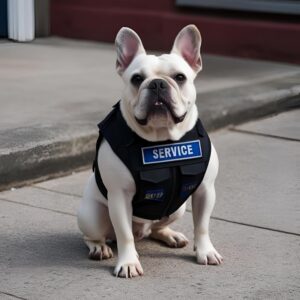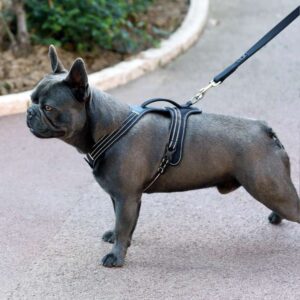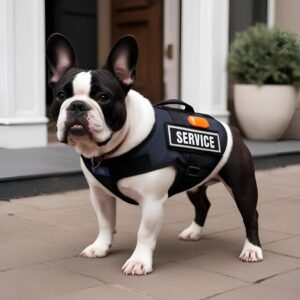French Bulldog as Service Dog: A Small Breed, Big Help

When you picture a service dog, you probably imagine a big Labrador or German Shepherd guiding someone across the street. But have you ever thought of a French Bulldog as a service dog? It might surprise you, but these small, bat-eared “Frenchies” can make wonderful service companions. In fact, a French Bulldog as service dog is not only possible – it can be a fantastic idea for many people with disabilities who need a little help and a lot of love.
In this guide, we’ll explore how French Bulldogs can serve as service dogs. We’ll answer “can French Bulldogs be service dogs?”, discuss why size doesn’t always matter in service work, and look at the kinds of tasks a Frenchie can excel at ( anxiety, PTSD, depression support, or even helping with small mobility tasks).
Can a French Bulldog Really Be a Service Dog?
Absolutely, yes! French Bulldogs can indeed be service dogs. While they’re not the first breed that comes to mind, any breed of dog can be a service dog if properly trained for specific tasks. The key is matching the dog’s abilities to the handler’s needs. Frenchies might be small, but they are intelligent, eager to please, and very attuned to their owners – all traits that can make a great service dog.
It’s important to understand what a service dog is. A service dog is not the same as an emotional support dog. Service dogs are specially trained to perform tasks that assist someone with a disability in daily life.
Under laws like the ADA, the tasks must be directly related to the person’s disability (for example, alerting to a medical issue or helping navigate. Emotional support animals (like a pet that comforts you when you feel down) don’t require special training and don’t have the public access rights that service dogs do.
That said, French Bulldogs often shine as emotional support dogs and can step up to full service dog duties when trained.
So, can French Bulldogs be service dogs?
Yes, and they’re especially suited for certain types of service roles. A French Bulldog likely wouldn’t be a good guide dog for the blind or a heavy-duty mobility assistant – they’re just too small for those jobs. They can’t pull wheelchairs or support a person’s weight.
However, Frenchies excel as service dogs for people with psychological or emotional disabilities and mild physical assistance needs. Their even-tempered, affectionate nature and loyalty make them ideal partners for individuals with conditions like anxiety, PTSD, or depression.
They love being with their humans and rarely bark excessively, which is a great trait for a working dog in public settings. In short, a French Bulldog might not look like your typical service dog, but they can definitely act the part for the right person!
Why Size Doesn’t Always Matter in Service Work
When it comes to service dogs, bigger isn’t always better. Sure, a large dog can perform tasks that a small dog can’t, but small breeds bring their own advantages to the table. French Bulldogs are a great example of why size doesn’t always matter in service work.
Let’s start with some perks of having a small service dog like a Frenchie:
Easy to Handle and Travel With
French Bulldogs are compact (usually under 30 pounds) and easy to manage. They fit comfortably in small living spaces and can even sit in your lap if needed. If you travel frequently, a small service dog is much less cumbersome on planes or buses than a giant breed. It’s much easier for a Frenchie to curl up at your feet or under a seat. Many disabled handlers find that traveling with a small service dog is less stressful than coordinating around a large dog’s space needs.
Lower Exercise Needs
Frenchies have moderate energy. They enjoy daily walks and play, but they don’t require marathon exercise sessions to stay happy. This can be a huge benefit if you have limited energy or mobility. For comparison, a high-energy large breed might need hours of exercise, which can be a challenge for some owners. A French Bulldog will be content with a reasonable amount of activity and plenty of couch cuddles (they are champion snugglers, after all).
Less Costly and Demanding
Smaller dogs typically eat less food and often have lower overall care costs. They’re also easier to pick up and handle during training or in tricky situations. For someone who might not be able to lift a heavy dog or afford the upkeep of a large breed, a Frenchie’s petite size is a practical advantage. Plus, Frenchies adapt well to different living environments – they’re as comfortable in a city apartment as in a house with a yard.
Now, that’s not to say size has no drawbacks. We have to be honest: French Bulldogs (and other small breeds) do have limitations in service work.
They can’t perform certain strenuous tasks due to their size and build. For instance, a Frenchie can’t provide stability to prevent a fall, act as a guide dog that someone can lean on, or pull heavy objects. If a task requires a lot of strength or height (like pushing a wheelchair or reaching high items), a larger service dog would be necessary.
Also, some people might not recognize a small dog as a service dog at first. There’s a bit of a stereotype that only big dogs are “real” service dogs. Because of this, you might get more folks trying to pet your Frenchie on duty or questioning if they’re a service animal.
Overall, French Bulldogs hold their own among the best small service dog breeds. Breeds often cited for small service dogs include Cavalier King Charles Spaniels, Poodles, Bichon Frise, Yorkshire Terriers, Corgis, and Pomeranians.
Frenchies deserve a spot on that list too. They have the friendly temperament, smarts, and adaptability that make a small dog great at service work. In many cases, size truly doesn’t matter – what counts is the dog’s training and heart.
Tasks a Frenchie Can Help With
You might be wondering what exactly a French Bulldog service dog can do. Despite their small stature, Frenchies can be trained to perform a variety of tasks to assist their handlers. Here are some common tasks a Frenchie can help with:
Psychiatric and Emotional Support Tasks
French Bulldogs are all-stars when it comes to helping with mental health disabilities like anxiety, depression, or PTSD. A Frenchie can serve as a service dog for anxiety by doing things like interrupting panic attacks, providing calming pressure, or redirecting their handler’s focus during anxiety episodes.
Many Frenchies naturally sense distress in their owners and will snuggle up or give gentle nudges to provide comfort. With training, they can take this further – for example, they might be taught to recognize signs of an impending anxiety attack or PTSD episode and then respond by licking the person’s hands or climbing onto their lap to ground them.
Deep Pressure Therapy (DPT) is a wonderful task for these stout little dogs; the Frenchie can lay its weight across a person’s lap or chest (like a warm weighted blanket) to help soothe anxiety or flashbacks. Their moderate weight and love of laps make this task a natural fit!
Reminding and Alerting
French Bulldogs are very alert and can be trained to pay attention to important cues. As a service dog for depression or PTSD, a Frenchie might learn to wake someone from nightmares (by pawing or licking to disrupt the nightmare).
They can be taught to remind their handler to take medication at a certain time (for instance, when an alarm goes off, the dog can nudge or fetch a pill bottle). Some Frenchies have even been trained to alert to certain medical conditions – for example, changes in their owner’s breathing or physical state that signal panic attacks or drops in blood sugar.
While they aren’t as commonly used for medical alerts as some larger breeds, their keen noses and strong bond with their owner mean they can be capable of alerting to things like oncoming anxiety attacks or other subtle cues.
Retrieving Small Items
Don’t underestimate a Frenchie’s ability to help with physical tasks! They have a sturdy build for a small dog and a strong grip. French Bulldogs can be trained to retrieve items for a person who has limited mobility or balance issues.
They can’t pick up something huge, of course, but they can fetch a dropped phone, keys, or remote control off the floor. They can carry small items in their mouth or a special pack. For someone who has difficulty bending down or is wheelchair-bound, this is incredibly helpful. Imagine you have back problems and drop your keys – your Frenchie service dog can happily scamper over, pick them up, and bring them to you.
They can also learn to open low cabinet doors or pull light wheelchair-accessible drawers with a tug toy. These might be “small” tasks, but they make a big difference in day-to-day independence.
Sound Alert (Hearing Assistance)
Frenchies have those big perked ears for a reason! They can work as hearing alert dogs for people who are deaf or hard of hearing. In this role, a Frenchie service dog would listen for important sounds – like a doorbell, phone ringing, alarm clock, or a smoke alarm – and then get your attention.
Typically, the dog would paw at you or lead you toward the source of the sound. For instance, if someone knocks on the door, your Frenchie might run to you and then trot back to the door to say “Hey, there’s someone here.” Their natural attentiveness and desire to stay near their owner come in handy for this job. And since they don’t bark much without reason, if your Frenchie is barking insistently, you’ll know something’s up!
Companionship and Interrupting Isolation
Sometimes the most important thing a service dog can do is simply be there. French Bulldogs are champion cuddlers and clowns; they bring a lot of joy and routine to their handler’s life.
For someone with depression, having a Frenchie service dog means you have to get out of bed in the morning to feed and potty the dog – that routine itself can be life-saving. Frenchies will nudge you for playtime or cuddle time, naturally interrupting spells of isolation or sadness.
They can be trained to gently interrupt harmful behaviors (for example, nudging or pawing at someone who’s engaging in self-harm or compulsive behaviors, thus distracting them). While these tasks might seem simple, they are incredibly valuable for psychiatric service dog work and can greatly improve a person’s quality of life.
As you can see, French Bulldogs can cover a lot of bases as service animals. They’re especially suited to psychiatric service dog duties, helping with conditions like anxiety, PTSD, and depression in very tangible ways. They may be small, but their impact is mighty – often providing emotional stability, independence, and even safety for their handlers. Just remember that any service dog (Frenchie or otherwise) needs proper training for these tasks, usually with professional guidance. With training and patience, a Frenchie can learn all sorts of helpful behaviors to become your little four-legged assistant.
Frenchie vs. Belgian Malinois: A Sizeable Debate
Now, let’s address the elephant (or rather, the big dog) in the room. We’ve been championing the petite French Bulldog, but how do they stack up against one of the most renowned service and protection breeds, the Belgian Malinois? If Frenchies are the lovable sidekicks of the service dog world, the Malinois is often seen as the elite special agent. It’s famous as a top-tier police and military dog and an absolute powerhouse in service roles that demand athleticism and focus.
Belgian Malinois are indeed incredible. They’re medium-to-large sized dogs (often around 60-70 pounds of muscle) and are known for their unmatched loyalty, intelligence, and energy. These dogs are so trainable and driven that they’re the go-to breed for many police K-9 units and even Navy SEAL teams. In service dog work, Malinois excel in physically demanding tasks and specialized roles.
They have near-endless stamina, which means they can assist their handler for long hours without tiring. Need a dog to help you walk by providing balance support? A Malinois has the size and strength for that. Need a dog who can perform search-and-rescue or detect something with its nose?
The Mal will happily go all day. They’re also protective and alert, which in some cases is useful for a service dog . In short, Belgian Malinois are often the gold standard for working dogs when you need athleticism and precision.
Frenchie is an easy-going service pet
A French Bulldog, on the other hand, is more of a comfy sedan – steady, easygoing, and low-fuss. Frenchies are affectionate couch potatoes at heart. They bond strongly with their owners, too, and remain loyal and attentive, but without the over-the-top drive of a Malinois. This makes the Frenchie much easier for many people to handle day-to-day. They won’t require you to run five miles every morning before work just to mellow out! For someone dealing with mental health issues, the Frenchie’s calming presence and manageable energy can be a much better fit.
In terms of training, Frenchies can be a bit stubborn sometimes (that bulldog streak), but they are food-motivated and love to please you when properly encouraged. They’ll learn their service tasks with consistency and positive reinforcement, and they generally behave well in public with socialization.
A Malinois is more uniformly obedient once trained, but training a Mal is practically a part-time job in itself. Also, consider public perception: a Belgian Malinois might intimidate people around you.
A French Bulldog, in contrast, tends to put smiles on faces. People see a small, friendly-looking dog and often feel more at ease. (Granted, you may have to fend off a few admirers who want to pet the cute Frenchie, whereas most folks know not to distract a police-type dog.)
Gear Up: The Frenchie Service Dog Vest & More
One thing many service dog owners do is gear up their pup with some special equipment. While not required by law, using a service dog vest or harness on your French Bulldog can be really helpful. It clearly identifies your Frenchie as a working dog and not just a pet out for a stroll. This can save you a lot of hassle when you’re in public places. People are less likely to try to distract or pet a dog that’s wearing a vest with labels like “Service Dog” or “Do Not Pet”. And if someone questions you, that vest is a quick visual cue that your dog is there to help you with a disability.
For French Bulldogs, it’s important to get gear that fits their compact, stocky body. A Frenchie service dog vest is usually a small vest or harness designed for a barrel-chested, short-bodied dog. It should be adjustable and comfortable, not restricting their breathing (remember, Frenchies are a brachycephalic breed with a short snout, so we want to keep them cool and breathing easy). Many owners opt for a lightweight mesh vest in warmer weather, or a padded harness style that distributes pressure evenly. The vest often has handles or attachment points in case you need to grab onto your dog briefly or attach a leash or ID tags.
Buy gear only from specialized stores
There are even specialty shops that cater to French Bulldogs’ unique shapes and needs. For example, some Frenchie owners get their gear from breed-specific boutiques like our Frenchie Space, which offers Frenchie-sized harnesses, vests, and other accessories.
A well-fitted Frenchie service dog vest from a place like that will not only do its job functionally but can also look pretty stylish on your pup! The goal, of course, is function over fashion – clear “Service Dog” patches and a solid build – but no rule says your helper can’t be cute and comfy at the same time.
Aside from vests, other useful gear for a Frenchie service dog might include:a good leash (possibly hands-free leash for those with mobility issues), identification tags/cards, and even boots if your dog will be walking on hot pavement or rough terrain. Frenchies can also wear little backpacks if they need to carry something small for you, though you’ll want to be mindful not to overburden their small frame.
Lastly, always carry some water for your Frenchie (they can overheat easily), and maybe portable bowls, especially if you’re out and about for long periods working together. Taking care of your service dog’s comfort is crucial – they can’t do their job well if they’re thirsty or uncomfortable. So gear up wisely and keep your Frenchie feeling good!
French bulldog as Service Dog: Big Help Can Come in Small Packages
In conclusion, a French Bulldog as a service dog can be a match made in heaven for the right person. These little dogs have huge hearts and a natural instinct to stick by your side through thick and thin. They may never be as physically imposing as a German Shepherd or as intense as a Belgian Malinois, but Frenchies prove that big help can come in small packages. With proper training, a Frenchie can assist with everything from easing your anxiety and PTSD symptoms to fetching your dropped keys. They bring laughter, love, and a sense of security to their owners’ lives – and isn’t that what the best service dogs are all about?
If you’re considering a service dog for anxiety, depression, or other disabilities that a French Bulldog is suited for, don’t overlook this breed. French Bulldogs can be service dogs that truly make a difference, especially for those who need a loyal companion to help navigate emotional challenges and small daily tasks. They offer a wonderful balance of companionship and utility, wrapped up in an adorable, wrinkly package.








 French Bulldog Jackets & Coats
French Bulldog Jackets & Coats French Bulldog Dresses & Skirts
French Bulldog Dresses & Skirts French Bulldog Hoodies
French Bulldog Hoodies French Bulldog Sweaters
French Bulldog Sweaters French Bulldog Shirts
French Bulldog Shirts French Bulldog Pajamas
French Bulldog Pajamas French Bulldog Costumes
French Bulldog Costumes French Bulldog Life Jackets
French Bulldog Life Jackets

 French Bulldog Collars
French Bulldog Collars French Bulldog Harness
French Bulldog Harness
 French Bulldog Backpacks
French Bulldog Backpacks







